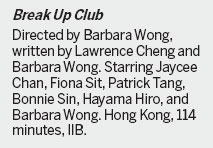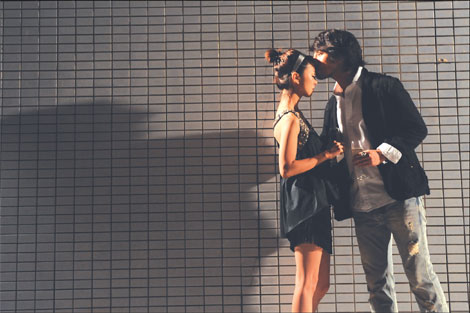YouTube, or not YouTube?
Updated: 2010-06-19 07:00
By Elizabeth Kerr(HK Edition)
|
|||||||
|
Flora (Fiona Sit) is tempted by the glamour and excitement Lies (Hayama Hiro) offers in Break Up Club. |
Documentary filmmaker Barbara Wong finds her narrative footing with the ultra-modern romance Break Up Club, Elizabeth Kerr reports.
In Break Up Club (opened in Hong Kong Thursday), Joe (Jaycee Chan) and Flora (Fiona Sit) are a typical young on-again off-again couple, seemingly cut from the Opposites Attract school of dating. She has ambitions that transcend her station, while he is happy to laze about doing odd jobs and barely getting by. When Flora dumps him once again, Joe turns to a mysterious online service that magically reunites former lovers - as long as the client is willing to break up another couple. Joe logs onto "breakupclub.asia" and throws a wrench into his friends Sunny and Fanny's (Patrick Tang and Bonnie Sin) relationship and wins Flora back.
The catch in all this is that the story unfolds as a chronicle of Joe and Flora's ups and downs as documented by ... Joe and Flora. Using a small digital camera that filmmaker Barbara Wong - played by filmmaker Barbara Wong - gives Joe to record every move he and Flora make, Break Up Club blurs the divide between fantasy and reality, and plays a trippy game of non-fiction within fiction, based on non-fiction. It's all very meta.
The short way to sum up Break Up Club is to call it Hong Kong's first YouTube romance, and director/co-writer Wong lets loose a robust laugh in agreement. "You know what? You're right. It's a very good description." Wong, a graduate of the HKAPA and NYU, has been working for a decade and started her career in documentary - which goes a long way toward explaining why her most rounded feature to date hinges on "reality" as it's interpreted by today's twentysomethings. It could be lumped in with films as diverse as the J. J. Abrams-produced Cloverfield, Andrea Arnold's psychosexual surveillance thriller Red Road, and the "found footage" shorts and features by Gustav Deutsch, Dariusz Kowalski, and Nathaniel Dorsky. The connection isn't so much in theme or content as it is with format. The so-called YouTube generation, with its fixation and dependence on, or casual acceptance of electronic media (camera phones, Twitter, digital still/video cameras, CCTV) and reality television has brought our collective tendency to filter our lives through media to the fore.
When Wong and frequent writing partner Lawrence Cheng came up with the idea, it was more of a personal quest to try something new for Wong. "My first film was a documentary, Women's Private Parts, and I wanted to try and put documentary and drama together," she explains. To that end, the duo worked independently (and lost funding at one point) and completed the film the way they wanted to. Wong greets the likening of Club with Cloverfield et al enthusiastically and agrees in spirit, but ultimately she was far more interested in the idea of documenting one's own life than in cobbling a story together from other sources.
"I was actually more focused on the 'self-filming' part of the movie. I think it's the culture now. It's a very big part of romantic relationships, especially in Hong Kong. Even 10 years ago things were different. Now it seems like this is part of dating. I wanted to capture this time; twenty years now it may be something different," Wong explains.
Wong is known for her ability to capture youth culture on screen (her first feature was Truth or Dare, a sort of Hong Kong Friends) but she is just as noted for peppering her films with ideas and characters that don't get a lot of respect in other arenas - chiefly women. Wong credits co-star Sit's ability to improvise and willingness to insert herself into the role as part of the reason for Flora's veracity. In the film, Flora is faced with the standard question of whether to embrace the exciting, independent future she craves with Lies (Hayama Hiro), a Japanese artist Flora's working with, or stay in Hong Kong and muddle through a sincere, trying relationship with Joe. To Club, Wong, and Sit's credit, Flora never once pulls the requisite whiny princess pose so common in Hong Kong cinema, and always acts like a recognizable young woman - warts and all.
"I try to capture realness in all my characters, especially the female characters. Because most male directors portray women as the kind of women they want. And ... a lot of the time it's not real. So as a female director I do have this mission. When there's a female character in my films it has to be real," Wong states. Sit's own input blurs that reality/fantasy line again, but that was, after all, part of Wong's vision. "This kind of shooting gives the audience an intimate feeling. Like you're sneaking into their private lives. (Because) of that the actors are even more natural. It actually seems like it wasn't made by Barbara Wong; it was made by the characters."

Break Up Club is by no means perfect: There are moments where logic battles with onscreen action and it could stand some trimming (Wong does admit to having "more footage than I knew what to do with," after the 22-day shoot). But its defiantly individualistic point of view, novel, contemporary structure and refreshing performance by Sit make it stand out against Hong Kong's current cinematic landscape. It's more dramedy than rom-com, and offers up the kind jolt the local industry's prevailing perspective needs.
Wong's next film, Perfect Wedding starring Miriam Yeung (out in the fall), takes her away from the kids and allows Wong to play in a more adult playground. After that she's hoping to try her hand in genre filmmaking - action or a gangster film - which brings up comparisons to Oscar-winner Karthryn Bigelow. Does Wong get tired of addressing her gender, as Bigelow has so often hinted? "I've just accepted that this question is always going to come up. There isn't time to think 'Oh, I'm a woman' when you're making a film. There's just no time for that on the set. But I'm ready for the question. I don't mind." But she does concede that women do make different movies - and that that's a good thing. "I think I'll bring a female point of view to it. Men are about brotherhood and showing off. I'm not sure what my vision would be yet, but I'm sure it will be different."
|
Flora (Fiona Sit) and Joe (Jaycee Chan) come to a personal crossroads in the dramedy Break Up Club. |
(HK Edition 06/19/2010 page4)

